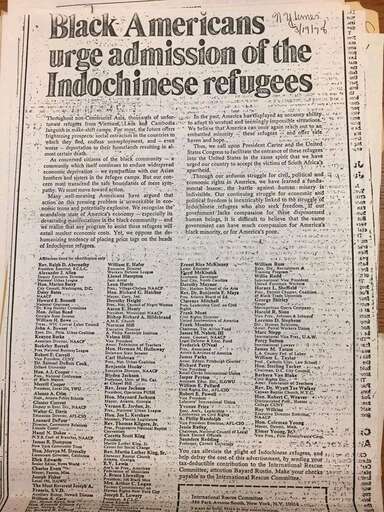
Repost: Sarath S. Suong
Image credit: Sokunthary Svay
My Khmer and Southeast Asian folks. Please take a few minutes and read this letter from a coalition of Black leadership published in the New York Times on March 19th, 1978.
Read every single word.
Read it and think about how you are responding right now when Black folks are saying they are facing genocide. And then let's have a real conversation and let's make plans for how we can join the fight for Black lives.
#BlackLivesMatter #Khmers4BlackLives #SoutheastAsians4BlackLives #RefugeeResistance4BlackPower
New York Times, March 19th, 1978
Black Americans urge admission of the Indochinese refugees
Throughout non-Communist Asia, thousands of unfortunate refugees from Vietnam, Laos and Cambodia languish in make-shift camps. For most, the future offer frightening prospects: social ostracism in the countries to which they fled, end unemployment, and - even worse - deportation to their homelands resulting in almost certain death.
As concerned citizens of the black community - a community which itself continues to endure widespread economic deprivation- we sympathize with our Asian brothers and sisters in the refugee camps. But our concern must transcend the safe boundaries of mere sympathy. We must move toward action.
Many well-meaning Americans have argued that action on this pressing problem is unworkable in economic terms and potentially explosive. We recognize the scandalous state of America's economy - especially its devastating manifestation in the black community - and we realize that any program to assist these refugees will entail modest economic costs. Yet, we oppose the dehumanizing tendency of placing price tags on the heads of Indochinese refugees.
In the past, America has displayed an uncanny ability to adapt to unusual and seemingly impossible situations. We believe that America can once again reach out to an embattled minority - these refugees - and offer safe haven and hope.
Thus, we call upon President Carter and the United States Congress to facilitate the entrance of these refugees into the United States in the same spirit that we have urged our country to accept the victims of South Africa's apartheid.
Through our arduous struggle for civil, political and economic rights in America, we have learned a fundamental lesson: the battle against human misery is indivisible. Our continuing struggle for economic and political freedom is inextricably linked to the struggles of Indochinese refugees who also seek freedom. If our government lacks compassion for these dispossessed human beings, it is difficult to believe that the same government can have much compassion for America's black minority, or for America's poor.
Image credit: Sokunthary Svay
My Khmer and Southeast Asian folks. Please take a few minutes and read this letter from a coalition of Black leadership published in the New York Times on March 19th, 1978.
Read every single word.
Read it and think about how you are responding right now when Black folks are saying they are facing genocide. And then let's have a real conversation and let's make plans for how we can join the fight for Black lives.
#BlackLivesMatter #Khmers4BlackLives #SoutheastAsians4BlackLives #RefugeeResistance4BlackPower
New York Times, March 19th, 1978
Black Americans urge admission of the Indochinese refugees
Throughout non-Communist Asia, thousands of unfortunate refugees from Vietnam, Laos and Cambodia languish in make-shift camps. For most, the future offer frightening prospects: social ostracism in the countries to which they fled, end unemployment, and - even worse - deportation to their homelands resulting in almost certain death.
As concerned citizens of the black community - a community which itself continues to endure widespread economic deprivation- we sympathize with our Asian brothers and sisters in the refugee camps. But our concern must transcend the safe boundaries of mere sympathy. We must move toward action.
Many well-meaning Americans have argued that action on this pressing problem is unworkable in economic terms and potentially explosive. We recognize the scandalous state of America's economy - especially its devastating manifestation in the black community - and we realize that any program to assist these refugees will entail modest economic costs. Yet, we oppose the dehumanizing tendency of placing price tags on the heads of Indochinese refugees.
In the past, America has displayed an uncanny ability to adapt to unusual and seemingly impossible situations. We believe that America can once again reach out to an embattled minority - these refugees - and offer safe haven and hope.
Thus, we call upon President Carter and the United States Congress to facilitate the entrance of these refugees into the United States in the same spirit that we have urged our country to accept the victims of South Africa's apartheid.
Through our arduous struggle for civil, political and economic rights in America, we have learned a fundamental lesson: the battle against human misery is indivisible. Our continuing struggle for economic and political freedom is inextricably linked to the struggles of Indochinese refugees who also seek freedom. If our government lacks compassion for these dispossessed human beings, it is difficult to believe that the same government can have much compassion for America's black minority, or for America's poor.